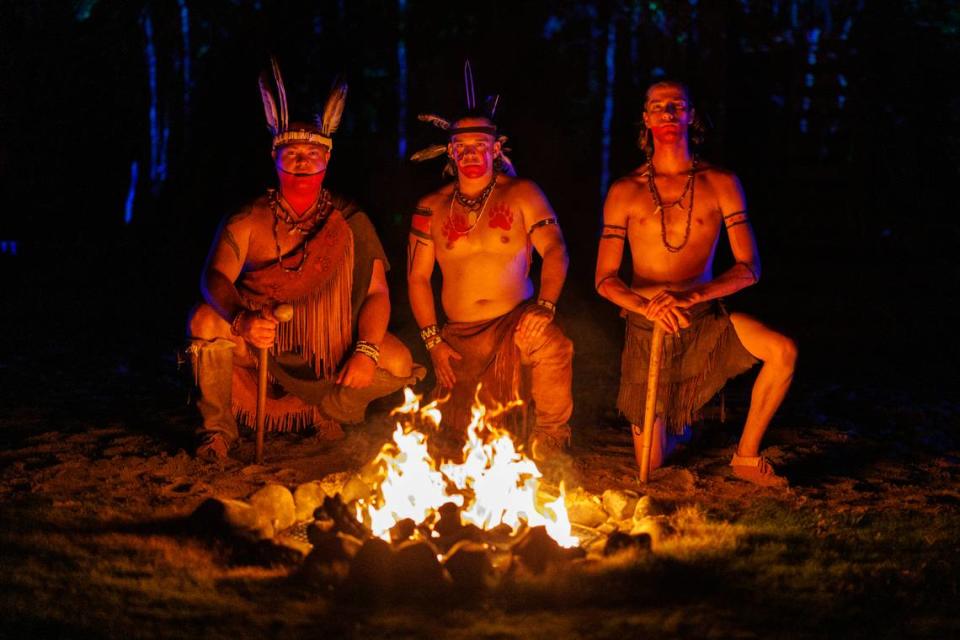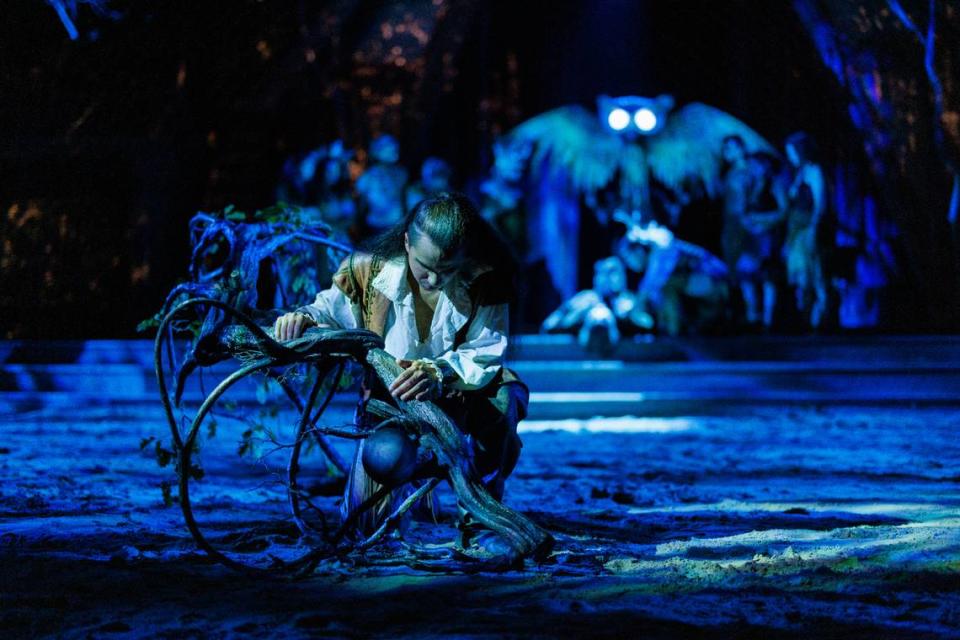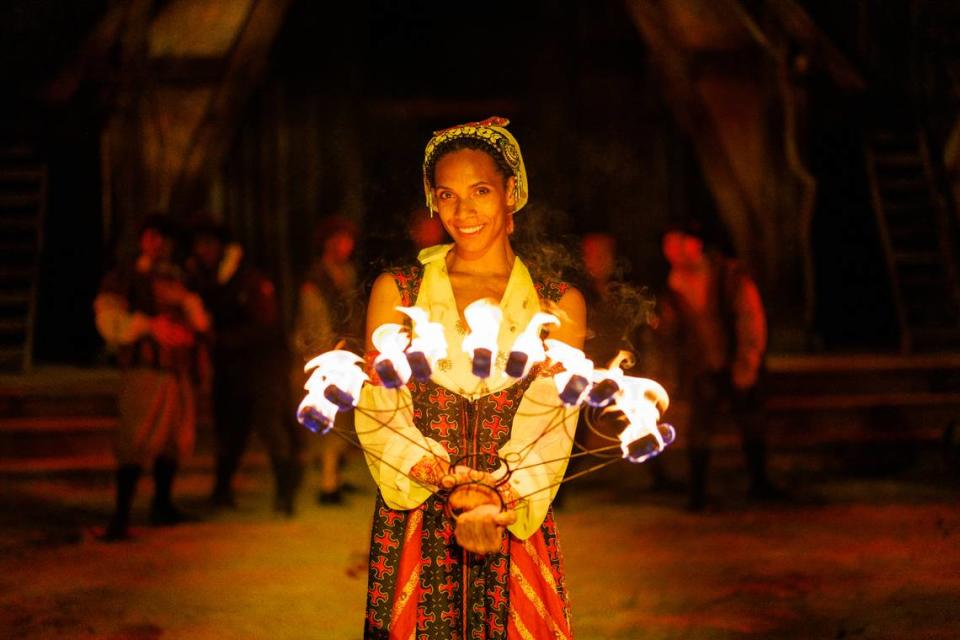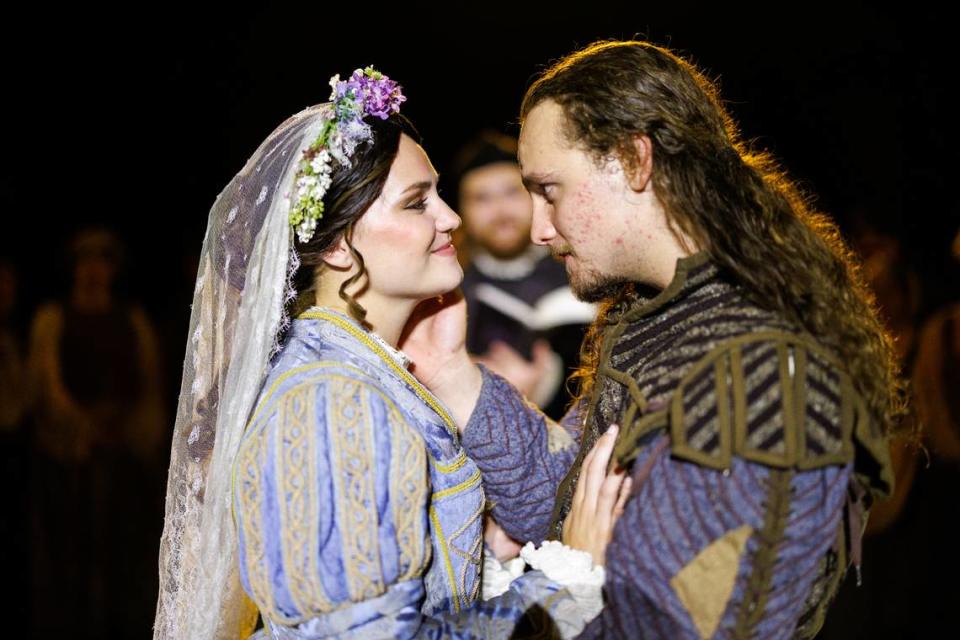Call it woke, call it Disney-fied, but the ‘Lost Colony’ is better now — and needs help
Five years ago, the makers of “The Lost Colony” got a mandate to modernize their saga of settlement gone belly-up — an outdoor costume-drama grown clunky, overlong and racially problematic in its old age.
For starters, the story of North Carolina’s vanishing English setters lasted for a nap-inducing three hours, full of awkward scene changes between Queen Elizabeth’s London and the shores of Roanoke Island.
Worse, the production still cast white actors to play Native American characters in “redface,” and it had a long history of unflattering portrayals dating to the original 1937 script, which included the line, “When moon come big, white man be gone.”
So first, “Lost Colony” got updated sound and lighting, using 3D projection to create ocean scenes onstage, complete with lightning strikes and storm-tossed ships.
The show added life-sized animal puppets, all of them with glowing eyes.
But more importantly, it hired Native American actors to play Manteo, Wanchese and the other indigenous characters from the play, updating the script to add their language, dancing and perspective toward their colonial neighbors.

For some purists, tinkering with the story of Virginia Dare is tantamount to putting jet engines on the Wright Brothers plane or polka-dots on the Hatteras lighthouse.
So predictably, some backlash followed.
“Some people say we Disney-fied it, and that’s not unfair,” said Chuck Still, executive director since 2022. “We had to do something. There are people who think we’ve gone ‘woke’. But I’ve said many times, “woke” is impossible to define. It’s used for whatever you don’t like. Putting in Native American roles, that seems so uncontroversial.”
$100,000 sought by March 31
Now a fund-raising challenge looms large:
The Anonymous Trust, which describes itself as “five contrarian women” trying to make a difference in North Carolina, have offered $100,000 toward the play’s increased costs — estimated at roughly $1 million a year. If the play can raise another $100,000 by the end of March, the trust will match it. Visit thelostcolony.org to donate.

One sign makes this goal seem reachable:
In the several years of tweaking, bringing North Carolina’s oldest story into the 21st century, the naysayers have largely disappeared — or at least gotten drowned-out. The notorious “woke” critique on Trip Advisor from 2021 — quoted in a Washington Post story — and others like it, are now outnumbered 17 to 1.
The show’s impact has grown from celebrating the first English birth to presenting the Natives already present on Roanoke Island as fleshed-out characters with their own story to tell.
“It’s a big deal for our people,” said Kaya Littleturtle, a member of the Lumbee tribe and the show’s cultural advisor. “To be represented on a stage like that, where there’s thousands and thousands of people who come, and for a lot of them, we’re the first Native Americans they’ve actually seen.
“As you watch the play now,” he added, “it’s not so much ‘There’s a Good Guy and a Bad Guy,” as it is, ‘There’s this perspective, and there’s that perspective.’ “

Andy Griffith and Chris Elliott
The play depicting the doomed settlement of 1587 dates to 1937, when Paul Green wrote the script in the middle of the Great Depression, pitting the uninvited English against the Natives fearing displacement.
The show sparked a movement toward outdoor drama and drew tourists to Manteo, site of the original colony. President Franklin Roosevelt famously attended in the first year, noting that while the colonists’ fate remained unknown, “the story of America is largely a record of that spirit of adventure.”
An estimated 4 million people have flocked to the Outer Banks to see “The Lost Colony” since then — many of them repeat viewers — and the play served as training ground for a slew of famous names, most memorably Andy Griffith, but also Eileen Fulton from “As the World Turns” and Chris Elliott of “Schitt’s Creek” fame.

Despite being central characters in the colonial culture clash, Native voices in the old productions were limited — sometimes to little more than grunts.
Now Littleturtle has recruited cast from 14 different tribes around North Carolina and the Southeast, and incorporated authentic Algonquin language into the script.
“It used to be, in the old play, they chopped off King Wingina’s head and tossed it around,” said Still. “Now his death is a very tragic thing, with the owl of death puppet.”
Veterans of “The Lost Colony” note the show has changed dozens of times since it’s opening in the 1930s, a shift in thinking that has evolved along with North Carolina.
“It changes every year,” said Joey Cassella, who plays Sir Walter Raleigh. “Shakespeare was a character at one point. It’s easy to point fingers at this new show and say, ‘This is completely different.’ ”
‘The Lost Colony’ is always changing
The N&O raved about the show’s “new” and “dynamic” tone when Broadway choreographer Joe Layton took over in 1964, bringing professional actors down from New York with big ideas about revamping the scenery.
For some Outer Banks locals, those changes from 60 years ago still sting.
“I’ve met people in Manteo who say, ‘I haven’t seen the show since Joe Layton ruined it,” said Stuart Parks, who plays English explorer John White. “The show you love so much, that tells the story you love so much, has to evolve or it’s going to close. It’s telling the same story, it’s just gotten rid of the racial overtones. If you still have issues, maybe you have issues with the racist in yourself.”
He offers this last comparison between old and new:
In the old days, he saw parents carrying children out on their shoulders, dead asleep. “Now,” he said, “the kids are awake. They’re excited. They talk about the fight scenes.
“That alone shows you how much the show has changed.”
A visit with Saxsquatch, the viral TikTok star from NC, as he launches his big US tour
The weird history of a cigarette-smoking, hog-riding monkey and NC barbecue mascot

